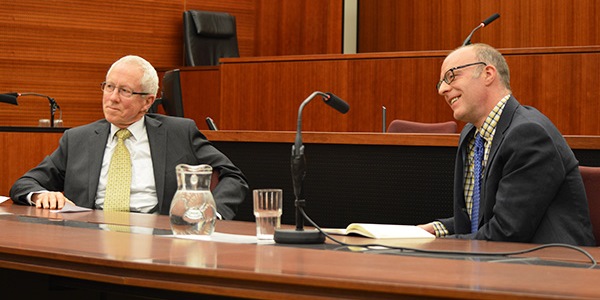Sources of law and fundamental rights
"If your rights are written down in constitutional form, you know where your rights are and what your rights are."

The Hon Justice Christopher Jessup, a Judge of the Federal Court of Australia, in conversation with Professor Neil Duxbury, Professor of Law at the London School of Economics.
That was the argument Professor Neil Duxbury, Professor of Law at the London School of Economics, put forth in favour of replacing the United Kingdom's Human Rights Act with a Bill of Rights.
Professor Duxbury shared his views on fundamental rights alongside the Hon Justice Christopher Jessup, a Judge of the Federal Court of Australia, as part of Melbourne Law School's first event in the 2015 'Judges in Conversation' series at the Federal Court of Australia on Tuesday.
"How you define your rights – the argument you use is crucial," Professor Duxbury said, reeling off a number of ways rights get to become "fundamental," including a long existence to the point where no one can remember them not existing.
Offering a perspective on Australian law, and making rights constitutional or not, Justice Jessup made it clear that if "they are not in the Act, and not in the Bill, they are not fundamental rights."
Both legal experts discussed whether any such Bill of Rights would best be drawn-up by a democratically elected Parliament or an international independent body.
"If they don't arrive from someone elected, they may be seen as objective," Professor Duxbury said.
"One suggestion is the adoption of an international instrument, a standard paradigm, and if a nation signs up, and it is picked up by domestic law, that invokes the democratic function," Judge Jessup said.
The pair agreed foreign precedence was important when determining what was best for one's own nation, as well as the common notion of taking for granted the fact that legislative and judicial functions were separate in both the UK and Australia.
Justice Jessup and Professor Duxbury differed in their opinions, however, on the use of laws being rewritten in Plain English, the former arguing against the change.
"I argue that it makes English plain but the definition obscure. We might be able to see it, we might be able to read it, but are not able to understand what it implies," Justice Jessup said.
By Andy Walsh